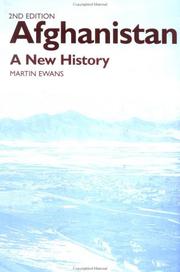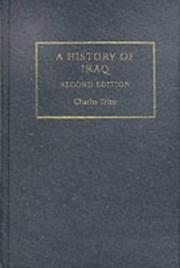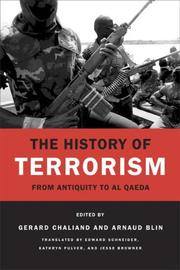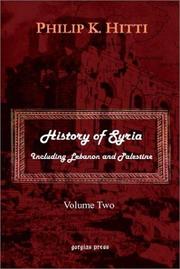| Listing 1 - 10 of 2100 | << page >> |
Sort by
|

ISBN: 0300069332 Year: 1997 Publisher: New Haven ; London Yale University Press
Abstract | Keywords | Export | Availability | Bookmark
 Loading...
Loading...Choose an application
- Reference Manager
- EndNote
- RefWorks (Direct export to RefWorks)
Croatia --- -History --- Croatia -History --- History. --- History

Abstract | Keywords | Export | Availability | Bookmark
 Loading...
Loading...Choose an application
- Reference Manager
- EndNote
- RefWorks (Direct export to RefWorks)
AFGHANISTAN--HISTORY --- Afghanistan --- History
Book
ISBN: 9782262037581 Year: 2014 Publisher: Paris : Perrin,
Abstract | Keywords | Export | Availability | Bookmark
 Loading...
Loading...Choose an application
- Reference Manager
- EndNote
- RefWorks (Direct export to RefWorks)
La relation des 'grandes batailles' a longtemps represente un genre tres prise chez les historiens, qui s'interessaient surtout aux capitaines de legende, Alexandre le Grand, Frederic II ou Napoleon. La demarche de l'auteur est tout a fait differente. Il propose une lecture totale de la bataille, du role de l'homme de base a celui du general, de la question des armes a celle du moral, sans omettre de presenter le contexte politique, religieux et social. Ce faisant, l'auteur privilegie ce qui est au coeur de la guerre a l'echelle mondiale : le caractere foncierement heterogene des grandes confrontations militaires - en d'autres termes, le choc entre des cultures, des pays, des peuples ou des armees radicalement differents, comme le conflit entres nomades (Mongols) et sedentaires (Arabes) au VIIe siècle. La bataille de Zama (202 av. J-C.) presente quant a elle un choc entre Rome et Carthage pour le controle de la Mediterranee. A Hattin (1187), ce sont croises et musulmans qui combattent, dans le cadre des croisades. A Tenochtitlan (1521), Cortes scelle le destin de la civilisation azteque. Les batailles de Gaugameles (331 av. J.-C.), des champs Catalauniques (451), d'Ayn Jalut (1260), de Lepante (1571), de Lutzen (1632), de Borodino (1812) et de Stalingrad (1942) sont de meme envergure : ells ont faconne le monde, de l'Antiquite au XXe siècle. Ainsi, a travers onze recits d'affrontements epiques se dessine une histoire de la guerre par ses batailles memorables.

ISBN: 0521821487 Year: 2003 Publisher: Cambridge New York Melbourne Cambridge University Press
Abstract | Keywords | Export | Availability | Bookmark
 Loading...
Loading...Choose an application
- Reference Manager
- EndNote
- RefWorks (Direct export to RefWorks)
IRAQ--HISTORY --- Iraq --- History

ISBN: 9780520247093 9780520245334 Year: 2007 Publisher: Berkeley University of California press
Abstract | Keywords | Export | Availability | Bookmark
 Loading...
Loading...Choose an application
- Reference Manager
- EndNote
- RefWorks (Direct export to RefWorks)
TERRORISM--HISTORY --- Terrorism --- History
Book
ISBN: 9780141980614 Year: 2016 Publisher: London : Penguin Books,
Abstract | Keywords | Export | Availability | Bookmark
 Loading...
Loading...Choose an application
- Reference Manager
- EndNote
- RefWorks (Direct export to RefWorks)
UKRAINE--HISTORY --- Ukraine --- History.
Book
ISBN: 9781787387270 Year: 2022 Publisher: London : Hurst,
Abstract | Keywords | Export | Availability | Bookmark
 Loading...
Loading...Choose an application
- Reference Manager
- EndNote
- RefWorks (Direct export to RefWorks)
How does the Taliban wage war ? How has its war changed over time ? Firstly, the movement's extraordinary military operation relies on financial backing. This volume analyses such funding. The Taliban's external sources of support include foreign governments and non-state groups, both of which have affected the Taliban's military campaigns and internal politics. Secondly, this is the first full-length study of the Taliban to acknowledge and discuss in detail the movement's polycentric character. Here not only the Quetta Shura, but also the Haqqani Network and the Taliban's other centers of power, are afforded the attention they deserve. This book is based on extensive field research, including hundreds of interviews with Taliban members at all levels of the organization, community elders in Taliban-controlled areas, and other sources. It covers the Taliban insurgency from its first manifestations in 2002 up to the Battle of Kunduz in 2015, which saw the group transition from an insurgency to a military force, and right up to its takeover of Afghanistan after the US wthdrawal in 2021.
Book
ISBN: 9780297608530 9781780228365 Year: 2021 Publisher: London Weidenfeld & Nicolson
Abstract | Keywords | Export | Availability | Bookmark
 Loading...
Loading...Choose an application
- Reference Manager
- EndNote
- RefWorks (Direct export to RefWorks)
History does not run in straight lines. It is made by men and women and by accident. The path of events and ideas does not stretch smoothly from Thucydides, through Machiavelli and thence to perpetual peace. Instead of inevitable progress, what we get is more often false starts, blind alleys, random events, good intentions that go wrong. This is therefore not a continuous diplomatic history. Richelieu and Mazarin inhabited a world we can hardly imagine today; but it is from their time that we can begin to see the outline of today's Europe. Talleyrand and the Congress of Vienna in 1815 take us closer to the present day. Talleyrand was a man of the ancient regime; but he was the first European statesman to see America. It is at this Congress that, for the first time, a humanitarian question - the slave trade - was discussed. Humanitarian issues have formed part of the diplomatic agenda ever since. Robert Cooper's incisive and elegantly written book includes a brilliant analysis of the people who built the Western side of the Cold War. The high point of the drama was the Cuban Missile Crisis, with its contrast between the open debate that John F. Kennedy used to help him make decisions and the closed system in Moscow. Henry Kissinger is a pivotal figure in the post-war world, as well as one of the great writers on diplomacy. His story is in some ways typical: he failed in his most important aims, and succeeded in ways he never expected. Meanwhile a notable and neglected success story is that of German diplomacy in the last half-century. Robert Cooper's masterly The Ambassadors pieces together history and considers the fragments it leaves behind. It is these fragments that prove so illuminating.
AMBASSADORS --- DIPLOMACY--HISTORY --- HISTORY

ISBN: 0192851527 9780192851529 Year: 1986 Publisher: Oxford: Oxford university press,
Abstract | Keywords | Export | Availability | Bookmark
 Loading...
Loading...Choose an application
- Reference Manager
- EndNote
- RefWorks (Direct export to RefWorks)
Poland --- History --- History. --- PolandHistory. --- Poland - History

ISBN: 1931956618 Year: 2002 Publisher: Piscataway, NJ : Gorgias Press,
Abstract | Keywords | Export | Availability | Bookmark
 Loading...
Loading...Choose an application
- Reference Manager
- EndNote
- RefWorks (Direct export to RefWorks)
| Listing 1 - 10 of 2100 | << page >> |
Sort by
|

 Search
Search Feedback
Feedback About UniCat
About UniCat  Help
Help News
News